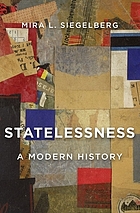(image source: Worldcat)
Book abstract:
Two world wars left millions stranded in Europe. The collapse of empires and the rise of independent states in the twentieth century produced an unprecedented number of people without national belonging and with nowhere to go. Mira Siegelberg's innovative history weaves together ideas about law and politics, rights and citizenship, with the intimate plight of stateless persons, to explore how and why statelessness compelled a new understanding of the international order in the twentieth century and beyond. In the years following the First World War, the legal category of statelessness generated novel visions of cosmopolitan political and legal organization and challenged efforts to limit the boundaries of national membership and international authority. By linking the emergence of mass statelessness to a revolution in legal consciousness, Siegelberg shows how the rights regime created after the Second World War ultimately empowered the territorial state as the source of protection and rights, against alternative political configurations. Today, more than twelve million people are stateless and millions more belong to categories of recent invention, including refugees and asylum seekers. As Statelessness makes clear, understanding the ideological origins of the international agreements that define approaches to citizenship and non-citizenship can better equip us to confront the dilemmas of political structure and authority at a global scale.More information with amazon.
(source: ESILHIL Blog)


No comments:
Post a Comment